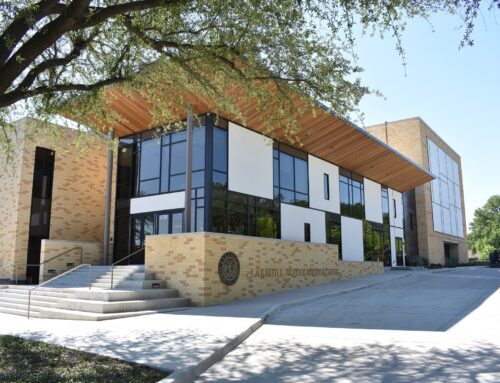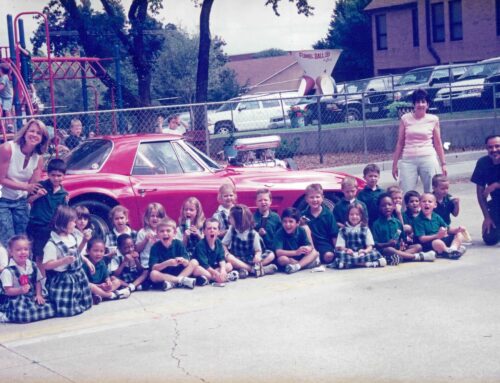With four young children hanging on her arms, a naïve and idealistic Kathleen Leos faced a cafeteria jammed with parents at James W. Fannin Elementary in August 1991 as their newly elected leader.
“I don’t know what I’m doing,” the incoming PTA president said, looking over the crowd.
“What do you want me to do?”
The families in the audience came from five cultures and spoke five languages, but they voiced one common desire: They wanted to stop 17 years of school busing and bring their children home.
Today, thanks to Leos and her neighbors, Dallas Public Schools is spending about $20 million to address their concerns.
Two new schools will be opened near Fannin, resulting in an end to busing and relief of school overcrowding in the area. The new facilities will be state-of-the-art, bringing educational resources into a long-neglected community.
Leos would seem busy enough without spearheading such grassroots neighborhood movements: She is a single mother with five children and works full-time as director of a daycare center for visually impaired children. And in May 1995, she was elected to the Dallas school board.
She has little time to eat or sleep but she wouldn’t have it any other way.
“She takes responsibility for change,” says Elsa Miglierini, a former Fannin teacher. “Kathleen is one of those people who has a sense of justice.
“She really believes one person can make a difference.”
Full of Surprises
Every year since our newspaper’s inception, Advocate Community Newspapers and the Lakewood Chamber of Commerce have teamed to honor a neighborhood resident who is making a significant, positive impact on our community.
Kathleen Leos personifies the Advocate Award.
The red-headed, 48-year-old Irish Catholic from Syracuse, N.Y., has become a hero in an inner-city neighborhood where many residents are first-generation immigrants, don’t speak English, can’t afford cars and struggle to provide their families with basic necessities.
Leos wasn’t supposed to be their leader.
She took over as Fannin’s PTA president when the person elected to the position resigned to work a second job.
Her prior volunteer experience at Fannin involved baking cookies for fund-raisers, helping with school carnivals and leading Girl Scout troops.
Leos says she didn’t know what she was committing herself to when she promised to end school busing.
Fannin, located at 4800 Ross, and James B. Bonham Elementary, located nearby on Henderson, only serve pre-kindergarten through third-graders, and there isn’t a neighborhood school for older students.
Instead, when Fannin and Bonham children reach fourth grade, they are bused to Lakewood Elementary, 3000 Hillbrook; Victor H. Hexter Elementary, 9720 Waterview; and Reinhardt Elementary, 10122 Losa – effectively desegregating these schools.
Busing prevents parents from becoming involved in their children’s education and fractures the community, Leos says. When busing begins after third grade, parent involvement in school tapers off, and bonds built through Fannin and Bonham’s PTAs are broken, Leos says.
Some parents leave their neighborhood and friends behind to live in apartments closer to their children’s new schools, Leos says. Others no longer participate in school because of lack of transportation and because going into more affluent, unfamiliar neighborhoods is intimidating.
Leos says her neighborhood’s problems with busing were so obvious, she thought making a change would be easy.
“I thought we’d just go down to the school board and ask for a new school,” Leos says.
“I had no idea what that meant. I was surprised every day. There was always something different to look at and think about. It’s like getting a master’s degree.”
The Five-Year Struggle
When Leos stepped in as PTA president, the school district was preparing a $275 million bond issue to improve facilities. At the time, building new schools near Fannin wasn’t even being considered.
So Leos and her group took action: They picketed the Dallas school board. They met with City officials to obtain proper zoning for new school sites. They even pleaded their case in federal court to U.S. District Judge Barefoot Sanders, who oversees the school district under a desegregation order issued in 1971.
The struggle for new schools required creating a multi-lingual chain of communication.
Fannin parents speak five native languages: English, Spanish, Vietnamese, Laotian and Cambodian. (Seventy-six percent of Fannin students are Hispanic, and 15 percent are Asian, which is the largest Asian population at a Dallas public school.)
Every meeting Leos organized and every flyer distributed was translated into these five languages.
“We learned to network,” Leos says. “Here’s five cultures that worked together. They had a common goal. That goal was the education of their children. For me, I feel honored that I could facilitate that process.”
“Kathleen is one of those people who brings people together from different backgrounds,” Miglierini says.
“She can talk to a vice president and get his support, or she can talk to a person with a second-grade education and get his support.
“That’s what makes her a great leader. She knows how to get people involved.”
After months of organizing, meeting, demonstrating and pleading, the parents’ voices were heard: Building schools in the Fannin area became the second priority of the school district’s bond issue (approved by voters in December 1992), overshadowed only by the new Townview Center to house high school magnet programs.
Wanting to finish what she started, Leos eventually campaigned for a seat on the school board and won. She wanted to join the board to ensure parents stay included in the development of the new schools, she says.
“She really understands how to operate within the system,” Miglierini says. “She learned that. She didn’t know it at first. At first, she was a parent like anyone else.”
Working Dusk to Dawn
Leos begins each weekday at 6 a.m., preparing her children for school. She then works from 9 a.m. to 4 p.m. at her daycare center, often skipping lunch. Once off work, she starts her second shift as a school board member, arriving home between 8 and 9 p.m. to check homework, run baths and finally sit down to eat.
A housekeeper helps care for the children, who often are involved in their mother’s school projects. When Leos has time to herself, she writes thoughts and poems in a journal. She goes to bed around midnight and devotes weekends to her family.
“It seems very natural,” says Leos about her schedule. “I’m thoroughly challenged.”
Leos has always enjoyed challenging herself.
As a child, Leos says she was fascinated by political movements and philosophy. She received a bachelor’s degree in liberal arts and classical studies from George Washington University in Washington, D.C., and always has loved to read, she says.
“Access (to the system) is about information,” Leos says.
Leos doesn’t bowl people over to accomplish her goals, but she doesn’t give up easily. Friends say she has a calm energy and describe her as a quick learner and meticulous researcher.
“If I have certain talents and abilities that have been given to me, I feel it is my responsibility to use them in a way that gives back,” Leos says.
Family Ties
Leos’ family moved from New York to Dallas when she was 19 years old. Six months later, she had taught herself Spanish.
As members of the Catholic church, Leos, her four brothers and sister grew up surrounded by Latin. Leos also attended Catholic school. Learning Spanish was easy, she says, because Latin is its root.
In the early 1980’s, Leos lived briefly in Aguascalientes, Mexico, her second husband’s hometown. They separated four years ago, and he returned to Mexico.
Leos has four children from this marriage: 13-year-old Liliana, who attends Alex W. Spence Middle School; 10-year-old Yesenia, a fifth grader at Hexter; 7-year-old Joel Jr., a first grader at Fannin; and 5-year-old Adriana, who will attend kindergarten at Fannin in the fall.
Leos also has an 18-year-old son, Marlowe, from a previous marriage. Marlowe suffered brain damage when hit by a car at age 12, but he will graduate this June from a high school in Oregon with special programs for his disability. He lives with his aunt.
Leos says her children and her religion tie her to Fannin’s Hispanic community, and her oldest child’s accident ties her to families who have children with special needs.
Because of her experience as a mother, parents trust her, says Bob Williams, the minister of missions for Ross Avenue Baptist Church, located next door to one of the new school sites.
Williams was one of many who worked with Leos to open the new schools. He and Leos also have coordinated English as a Second Language classes for Fannin-area parents.
Leos, who is on a school board seemingly riddled with racial conflicts, is able to turn people’s differences into strengths, Williams and Miglierin say.
“She doesn’t have a personal agenda,” Miglierini says. “She tries to help everybody, the kids from every race and every background.”
“She wants to do well for her kids, and she knows it’s a pretty hard job as a single mom,” Williams says. “She knows that other people are having the same difficulty.
“She has this faith that if she gets people together, they can do more together than separately. She believes in the dignity of each person. She fleshes out people’s potential when others can’t see that potential.”
An End, and a Beginning
This fall – five years since Leos’ first day as PTA president – busing at Fannin and Bonham will end.
The school district is opening the John F. Kennedy Learning Center within walking distance of Fannin for grades four through six.
And in Fall 1997, the Cesar Chavez Learning Center for grades kindergarten through sixth grade also will open near Fannin and Bonham to relieve overcrowding.
“Kathleen gets things done,” says Bonham Principal Criestela Garza. “She will fight for what’s right for the children.”
The learning centers will bring extended before- and after-school programs to the area, as well as more extracurricular activities – such as choir and band – computer labs, adult education classes, teachers with master’s degrees and a lower faculty-to-student ratio.
“We’re going to really accelerate learning,” Miglierini says.
“We have a lot of gifted kids who are not being recognized. This is an opportunity for them to really flourish.”
Leos and others also believe the new schools will lead to neighborhood revitalization.
“If people think education is efficient and effective in an area, that brings in dollars,” says Lakewood Chamber of Commerce President Helen Swint.
“People see it as a healthy environment in which to invest. Whatever we’re proud of, we give it our time and our money.”
Improvements in one neighborhood have a positive impact on surrounding neighborhoods, says Swint, who knows Leos through mutual community projects.
“Good things travel in ripples,” Swint says. “Kathleen cares. That kind of thing is catching.”
Leos credits her neighborhood’s hard work for the improvements to the Fannin area.
The community credits Leos for cutting through the bureaucratic red tape citizens – often face when trying to make changes in a big city.
“They didn’t know that poor people could get the ear of the powerful,” William says. “Now they do. The genie is out of the bottle.”
“Our resource was Kathleen,” Miglierini says. “She consolidated a lot of energy that was there, but that hadn’t found a focus. She was able to put it into words.”




